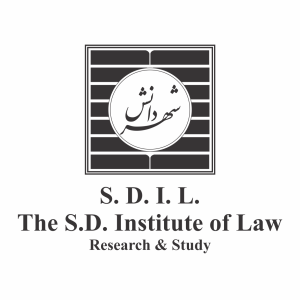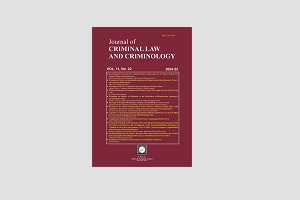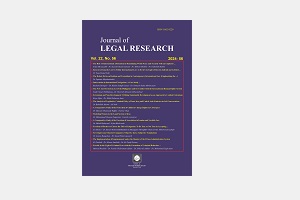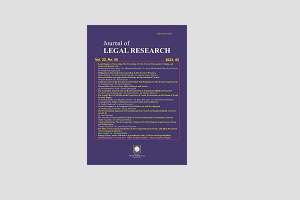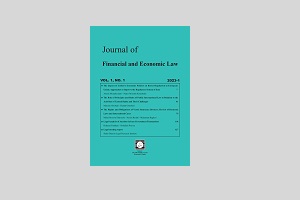Journal of
Legal Research
Number 4
Vol. II No. 2
Autumn 2003 – Winter 2004
Managing Editor: Vahid Eshtiagh
Editor-in-Chief: Seyyed Ghasem Zamani
Contents
Articles
Saddam’s Trial and the Question of Jurisdiction in National and International Law
Ali Khaleghi (Ph.D(.
Judgment of the International Court of Justice in the Oil Platforms Case: Judicial Diplomacy in International Justice
S. Jamal Seifi (Ph.D.)
Construction of the Wall in Palestinian Occupied Territories: the Question of its Legitimacy in the Shadow of Human Rights and Humanitarian Law
Victor de Currea-Lugo; Translated by S. Hossein Sadat Meidani
Multilateral Investment Guarantee Agency (MIGA) and Standards of Foreign Investment
Masoud Sabour
How to Apply the Principle of Non-Refoulement in front of War Refugees?
Fatemeh Kayhanloo
Legal Nature of Bank Guarantee in the Iranian Law
Alireza Masoudi (Ph.D.)
Special Issue: International Law and the Establishment of
Nuclear Security
Nuclear Security and Non-Proliferation in International Customary Law
Nader Saed
Nuclear Weapons as a Point of Coincidence of Jus ad bellum and Jus in bello
Hasan Savari
The Place of Provisional Application of the Additional Protocol to NPT in the Iranian Public Law
Parvaneh Tila
The Protection of Nuclear Installations in Armed Conflicts
Mohsen Abdollahi
Critique and Presentation
Decision of the General Board of the Supreme Court about Hearing of Insolvency Claim Before Imprisonment in Context of Iran’s International Obligations
S. Ghasem Zamani (Ph.D.)
Articles
Saddam’s Trial and the Question of Jurisdiction in
National and International Law
Ali Khaleghi (Ph.D.)
Abstract:
The capture of Saddam Hossein, former president of Iraq, has raised
seriously the question of his trial for the crimes that he has committed
against the Iraqi people during his reign and against his neighbors on the
occasion of his aggressions to Iran and Kuwait. Considering the great
harms inflicted to Iran and the damages to the international public order,
the peace and the security of international community caused by Saddam,
this article treats respectively the jurisdiction of Iranian tribunals and the
international penal instances to try the seniors of former Iraqi regime.
After examining the effectives and restrictions of these systems, the article
tends to show the way, which appears to ensure better a fair trial for all
defendants in order to protect their rights to defence and the rights of the
victims.
Judgment of the International Court of Justice in the Oil
Platforms Case: Judicial Diplomacy in International Justice
S. Jamal Seifi (Ph.D.)
Abstract:
After 11 years, finally on 6 November 2003 the International Court of
Justice delivered its Judgment on the merits of the Oil Platforms Case
between Iran and the United States. In the Judgment, the Court dismissed
Iran’s claim that by attacking and destroying Iranian oil platforms on 19
October 1987 and 18 April 1988, the United States interrupted the
freedom of commerce between the territories of the two countries and
breached its obligations under Article 10 (1) of the 1955 Treaty of Amity
between Iran and the United States. Thus, the Court rejected Iran’s claim
for compensation.
In the meantime, however, the Court found that the actions of the
United States in attacking Iranian oil platforms did not constitute a
measure for protection of fundamental security interests of the United
States from the point of view of Article 20(1)(d) of the Treaty of Amity as
interpreted in the light of principles of international law relating to the
use of force, there by indicating, implicitly, that the US actions were an
unlawful use of force under international law. However, as explained
above, the Court did not allow Iran’s claim for compensation. The Court
also rejected United States counterclaim that in allegedly attacking the US
ships in the Persian Gulf in the later part of Iran-Iraq war, Iran
interrupted freedom of commerce between the territories of the two
countries and beached its obligations under Article 10(1) of the Treaty of
Amity. Thus, the Court rejected the US claim for compensation.
Although the final Judgment of the Court did not satisfy the formal
claim of either party, the judicial diplomacy of the Court may be seen
within the general context of the international system and in the light of
reiteration of the importance of the rules of international law for
international peace and security. In addition, the Court’s Judgment
contains innovations in the international judicial process and creates
certain questions in that regard. In particular, the legal effect of the
Court’s finding with respect to non-compliance of the US actions with
Article 20(1)(d) of the Treaty Amity deserves independent analysis.
Construction of the Wall in Palestinian Occupied
Territories: The Question of its Legitimacy in the Shadow of
Human Rights and Humanitarian Law
Victor de Currea-Lugo
Translated by S. Hossein Sadat Meidani
Abstract:
Non fulfillment of international obligations by the Israel regime in the
occupied territories takes the new dimensions everyday. The construction
of a wall separating these territories in two sections, on the pretext of
fighting terrorism and protecting the security of Israel, is completely
against most international standards of human rights and humanitarian
law. Written in January 2004, this article examines the legitimacy of
construction of the wall from international law point of view.
Multilateral Investment Guarantee Agency (MIGA) and
Standards of Foreign Investment
Masoud Sabour
Abstract:
Foreign investment plays an essential role in economic development of
every country, specially in developing and less developed countries.
However non-commercial risks, such as currency transfer, expropriation
and similar measures, breach of contract, war and civil disturbances are
important factors which impede foreign investments.
The Multilateral Investment Guarantee Agency as a member of World
Bank Group was established in 1988. MIGA can plays an important role in
the encouragement of foreign investment complementing national and
regional investment guarantee programs and private insurers of
non-commercial risks.
How to Apply the Principle of Non-Refoulement in front of
War Refugees?
Fatemeh Kayhanloo
Abstract:
The principle of non-refoulement of refugees to their country is well
established in conventional and customary international law. However, the
rights of states to protect their national security has provoked some
challenges in this regard specially in the occasion of large vague of war
refugees.
Legal Nature of Bank Guarantee in the Iranian Law
Alireza Masoudi (Ph.D.)
Abstract:
Bank guarantee is a document, which is issued by the bank and by which
the bank undertakes to pay the mentioned sum of guarantee to the
beneficiary in case of original promissor’s violation and failure. However,
in the Iranian civil code a contract of guarantee has many differences with
bank guarantee in International Trade. The nature of bank guarantee in
the Iranian legal system has been discussed in this article.
Nuclear Security and Non-Proliferation in International
Customary Law
Nader Saed
Abstract:
Non-proliferation, in its strictly meaning, is a system for the control and
prevention of making new nuclear states. While the Nuclear
Non-Proliferation Treaty (NPT) has been enforced for more than three
decades and the UN Security Council as well as the IAEA Board of
Governors have issued many resolutions on this matter, they could not
transform it into UN international customary norm.
This Article analyzes the non-proliferation regime and its
international legal nature as a conventional or customary norm. The
author believes that the discriminatory rights and duties of the NPT’s state
parties that is unconformity with the equal sovereignty of states, have
impeded the opinio juris necessary to formation of a custom as an
important part of international community. In addition, enforcing a system
by some states under an inevitable condition and within a political
impulsion environment can not necessarily emerge the opinio juris or
collective opinion in the international community.
Nuclear Weapons as point of Coincidence of Jus ad bellum
and Jus in bello
Hasan Savari
Abstract:
As a fundamental principle, the use or treat to use of force is prohibited in
international relations.
Self-defence and UN collective security system are the only exceptions
of this principle. Weather International Humanitarian law is high
developed and stabilized which affects the use or treat to use of Nuclear
weapons even in the self defence. The issue is studied in the shadow of
advisory opinion of ICJ (1996).
The Place of Provisional Application of the Additional
Protocol to NPT in the Iranian Legal System
Parvaneh Tila
Abstract:
A treaty or a part of it may be applied provisionally before its entry into
force, if it is so provided or if the negotiating states have in some other
manner so agreed.
On 12 September 2003, IAEA Board of Governors adopted a
resolution about the application of the NPT safeguards agreement in the
Islamic Republic of Iran. In paragraph 6 of the resolution, IAEA requests
Iran to work with the Secretariat promptly and unconditionally, to sign,
ratify and fully implement the additional protocol as a confidence-building
measure, henceforth to act in accordance with the additional protocol. Iran
agreed to sign the additional protocol, and has provisionally applied it.
The current issue has been studied in the constitutional law of Iran.
The Protection of Nuclear Installations in Armed Conflicts
Mohsen Abdollahi
Abstract:
The international humanitarian law lays down the restrictions to the
activities of belligerents in the armed conflicts. The additional protocols to
Geneva conventions 1949 have forbidden the attacks to nuclear reactors of
electricity power and have tried to protect the civilian population living
near these reactors. The present article examines the conditions of this
protection and the possibility of transformation of these reactors to the
legitimate military objectives.
